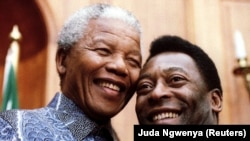The football legend's struggle from poverty to become a beloved icon in the game mirrors that of one of Africa's all-time soccer giant, Abedi Ayew Pelé.
The Ghanaian and now-retired soccer player was just a boy when people begun to liken him to the Brazilian player who died of cancer at the Albert Einstein Hospital in São Paulo Thursday. One of his daughters Kelly Nascimento confirmed the news in an Instagram post.
In a 2013 CNN interview, Pelé said that at the time he did not know the magical star, who is now credited as being the only footballer in history to have won three World Cups - in 1958, 1962 and 1970.
“You imagine that we don’t have access to televisions, we don’t have lights in our villages; we were closed in the very small village so we didn’t have access to all these things,” he told CNN.
“So for me, playing behind our modest windows and any small places we would get, we tried to play football. And then you see people who are a little bit older than you saying, ‘oh Pele, he plays like Pelé,'' he recalled in that interview.
It's a conversation that is still fresh in the mind of Accra-based sports journalist Owuraku Ampofo, who told VOA Thursday that the news of Pelé's demise was that of ''shock and appreciation'' for his contribution to the game.
''Overall, it is much more of a shock and appreciation here in Ghana, especially for what the legend has done for football, not just in Brazil, but then his contribution to the game globally.''
''His impact is immeasurable.... his life story of going through the struggle with football alone.. the only thing he held on to become successful was the game, and so his is a story that inspires the demographic beyond South America'', Ampofo said.
The sports pundit said Pelé's story has been a source of inspiration for Africans.
''Africans look at Pelé's story to get inspiration that no matter how bad things are for you at best, even where you start, whether you're handicapped, once you work hard and push your talents through, you should be able to rise to the top,'' he said.
The sports writer said Ghanaians will remember their connection to Pelé, and the impact he continues to have on African players as evident in tributes pouring in to honor his legacy.
''For Ghana especially, there is some form of connection,'' he said. ''Because early in the 1960s/70s when the country was dominating the Africa Cup of Nations and won three times, they were likened to Brazil at that time. And so the national team were referred to as the Brazil of Africa.''
According to the website of the world governing football body, FIFA, Pelé scored 1,281 goals in 1,366 games, with an impressive 0.94 goals per match. But many were in friendlies or in matches played as part of military service. In official competitions, Pelé netted 757 goals in 812 games.
The magical soccer icon is survived by six children. The seventh, a daughter he took years to recognize, died of cancer in 2006.
Some information was sourced from Reuters




